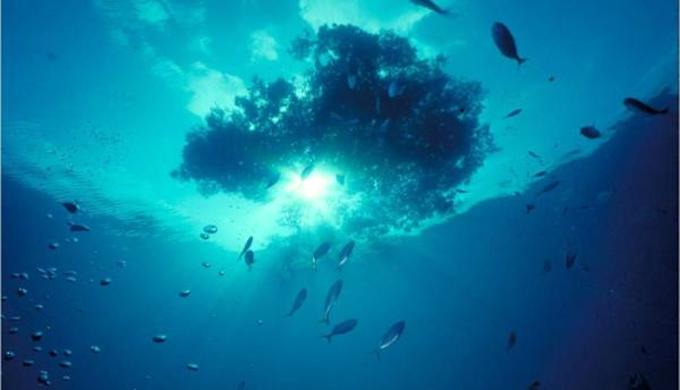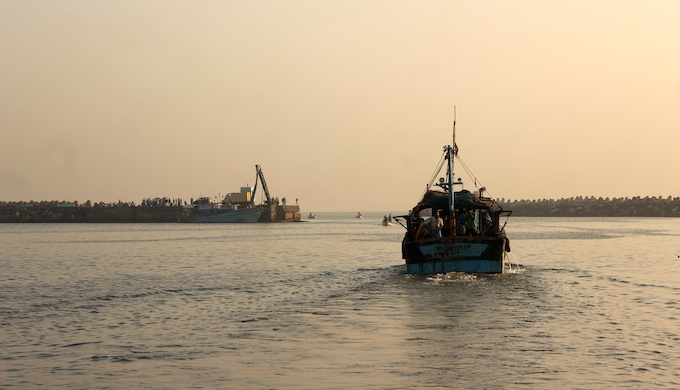India has to take a more proactive role in global negotiations for stronger conservation of high seas that are under threat from climate change

Sargassum provides an important habitat for migratory organisms and fish that have adapted specifically to these floating algae of the high seas (Photo by Don Kincaid/IUCN)
Popular images of climate change are often restricted to melting polar ice caps or desertification. However, there is another ecosystem in crisis — the oceans — and the prognosis is not promising.
There is now widespread recognition of the increasing urgency for better governance of the oceans. This is particularly true of those parts of the ocean which extend beyond a country’s jurisdiction, known as Areas Beyond National Jurisdiction (ABNJ), or more commonly, the high seas.
The United Nations Convention on the Law of Sea (UNCLOS) is the overarching law for regulating the seas. It does not, however, apply to the high seas. After decades of civil society mobilisation, the United Nations General Assembly (UNGA) in 2017 established an intergovernmental conference to develop a legally binding text under the UNCLOS.
The mandate of the treaty was the conservation and sustainable use of marine diversity in the high seas through a package of four issues — marine genetic resources, marine protected areas, environmental impact assessments, and capacity building including transfer of marine technology.
The third session in August 2019 had finalised the zero draft of this treaty. However, as with all things 2020, the fourth round scheduled for March has been indefinitely postponed. In April, the UNGA published a document containing comments received from various national and other stakeholders on the zero draft.
This document provides an opportunity to understand and analyse the issues at stake, giving civil society organizations time to mobilise and prepare for the final round of deliberations.
India and the high seas
While India has participated in the sessions leading up to the zero draft, it is absent from the document listing stakeholder comments. The only South Asian country that appears to have submitted comments is Pakistan.
This is significant considering that the government of India has two of only 30 exploration contracts issued globally by the International Seabed Authority for deep sea mining. The first for polymetallic nodules was signed in 2002 and is valid till 2022. The second is for polymetallic sulphides issued in 2016, which is valid up to 2031.
These contracts fall in and around the Central Indian Ocean basin, one of the major sources of polymetallic nodules of iron and manganese oxides. The basin coincidentally is also a declared Ecologically or Biologically Significant Marine Area (EBSA), known to be a major foraging point for four migratory seabirds and the site of a significant phytoplankton bloom in winters.

A global list of contractors with deep sea mining licenses as on April 2020 (Source: International Seabed Authority)
In addition to this, India is surrounded by EBSAs such as the Gulf of Mannar and the North East Indian Ocean, a corridor for Olive Ridley turtle migration. Another EBSA in the neighbourhood is the Arabian Sea Oxygen Minimum Zone (OMZ).
The OMZ is a unique and highly biodiverse ecosystem with low levels of oxygen, indicating higher levels of oxygen consumption caused by a high population of species. Researchers have identified this as one of 10 critical habitats globally that could form the first generation of high seas protected areas.
Multiple organisations, such as the International Union for Conservation of Nature (IUCN), the Deep Sea Conservation Coalition and Fauna and Flora International, have published research highlighting the risks of deep seabed mining.
The discovery of valuable minerals in the deep seas has led to increased interest in mining and the associated economic benefits. It is also pitched as less damaging than terrestrial mining and a source for marine renewable energy resources.
However, there is very little understanding of the deep oceans , and in the absence of a suitable regulatory framework, this could potentially lead to overexploitation of marine resources. A 2019 Blue Paper by the Ocean Panel notes that India is one of the nation states showing high levels of interest in deep sea mining and actively engaged in exploration without a comprehensive regulatory regime in place.
Way ahead
Meanwhile, international organisations continue to push for a stronger treaty on high seas. A preliminary analysis by the Institute for Sustainable Development and International Relations (IDDRI) concluded that “it is difficult to judge if the current draft treaty is sufficiently ambitious.”
The IUCN has proposed eight considerations for the final round, including increased recognition of the power of state parties and specifically spelling out their duties for international cooperation. These recommendations are ambitious, such as the formation of a conference of parties that has emergency powers to declare Marine Protected Areas if biodiversity there is under immediate threat.

A trawler heading out to sea from Chennai (Photo by Mathi Vinod)
In 2019, the Intergovernmental Panel on Climate Change (IPCC) released its Special Report on the Ocean and Cryosphere in a Changing Climate (SROCC). Increasing carbon emissions have caused ocean warming, ongoing unabated since 2005. The impact of this, combined with ocean acidification and oxygen loss, has begun manifesting in marine biodiversity and its distribution.
The impact of climate change on the oceans has implications for food production and livelihoods with higher levels of risk for coasts and its vulnerable communities.
The Indian discourse on the oceans is dominated by promises of a blue economy, the details of which are very rarely articulated. In recent times, the emphasis has solely been on the strategic importance of the oceans from a national security perspective.
The strategic narrative for the Andaman and Nicobar islands viz-a-viz China advocates for an increased infrastructure footprint, often ignoring the fact that the islands are home to over 100 designated Marine Protected Areas.
In late 2019, the federal government announced the launch of a Deep Ocean Mission. According to the website of the Office of the Principal Scientific Adviser to the Government, the objective of this mission is to “scientifically explore the deep oceans towards improving our understanding of the blue frontier” and to use this information to “address issues arising from long term changes in the oceans due to climate change”.
Despite the lofty objectives, India is conspicuously absent from the negotiations table to push for stronger conservation measures.
Anjana Vencatesan is a graduate of international security from Paris School of International Affairs, Sciences Po, who specialises in global risks and South Asia.

Very interesting write-up.